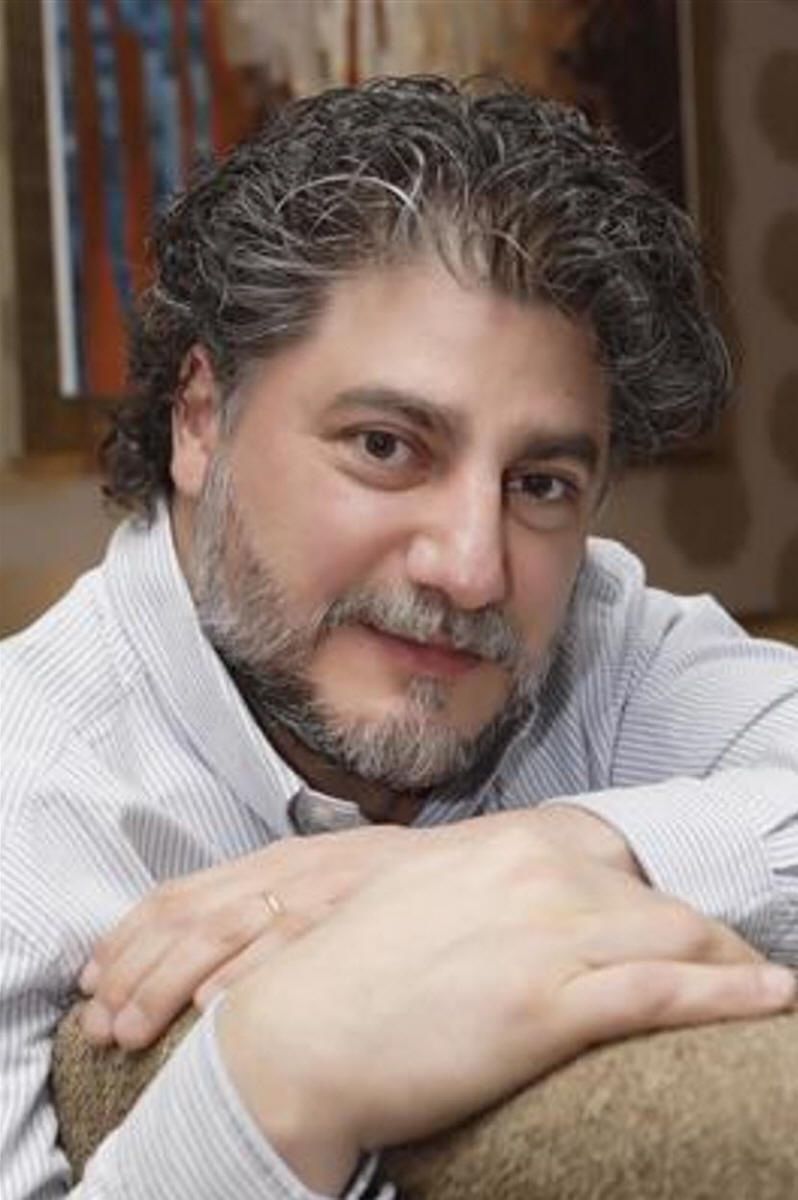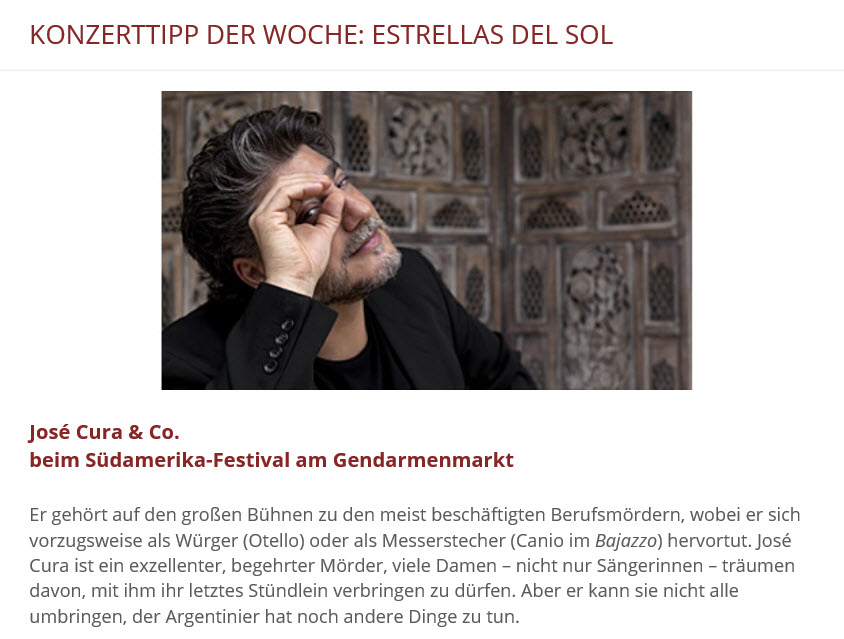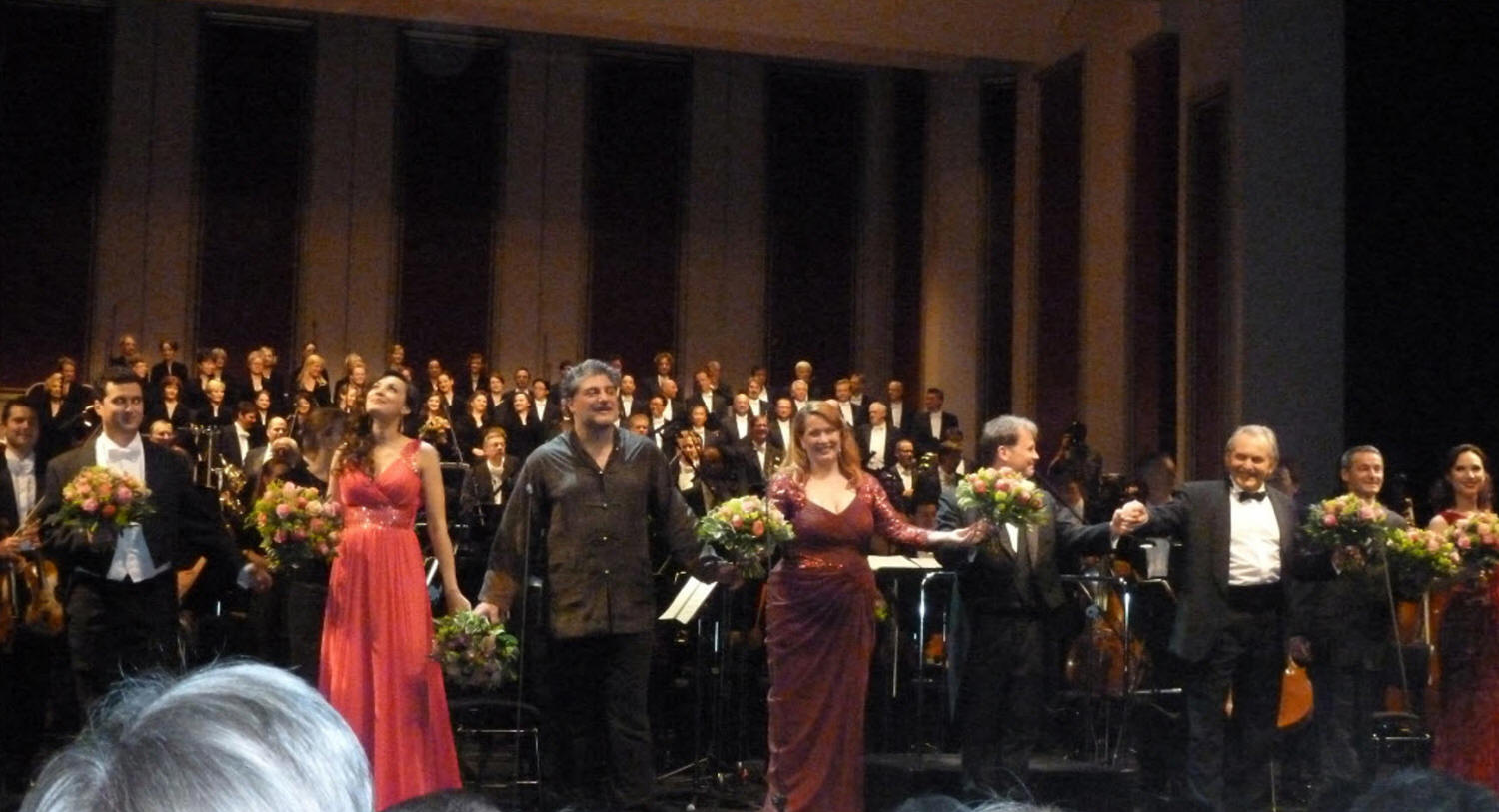
Bravo Cura
Celebrating José Cura--Singer, Conductor, Director
Concerts 2014 - 2015
2014
Berlin South American Festival



Concert Tip of the Week: Estrellas Del SolKlassikVolker TarnowFebruary 2014[Computer-assisted Translation // Excerpt]He is one of the busiest professional murderers on the big stages, particularly excelling as a strangler (Otello) or a knifeman (Canio in Pagliacci). José Cura is an excellent, sought-after murderer, and many ladies - not just singers - dream of spending their last hours with him. But he can't kill them all; the Argentinian has other things to do. And so it happens that he occasionally first conducts Cavalleria rusticana and then sings in Pagliacci after the interval. He studied piano and composition, and spent his first years in Argentina conducting choirs. Cura only switched to singing at the age of 20. Berlin has already seen him in various roles; the Konzerthaus's South America Festival is now presenting him as a lieder singer. In Ginastera's Canción del árbol del olvido and six songs by Carlos Guastavino, the great piano poet, Cura will reveal his irresistible charm, half gaucho and half tango dancer. This time, death is not necessarily to be expected, unless you take these deeply melancholic songs too much to heart. […] |
|
Argentine Tenor José Cura Amazes the International Audience in Berlin Deutsche Welle 21 Feb 14 [Computer-assisted Translation // Excerpt] Argentinian José Cura, one of the most celebrated tenors in the world, thrilled the Berlin audience with his interpretation of songs by composers from his country, accompanied by an orchestra conducted by the young Venezuelan Christian Vásquez. The recital in the main hall of the Konzerhaus, an architectural marvel in the heart of Berlin, was one of the highlight of the “Festival of South America,” which ends this Sunday after ten days of filling the German capital with Latin American rhythms. The concert program consisted of songs for tenor and orchestra by three of the major composers of Argentine classical music: Alberto Ginastera (1916-1983), Carlos Guastavino (1912-2000), and Héctor Panizza (1875-1967). Cura embroidered the repertoire with the voice and on-stage acting magnetism that becomes one of the great figures in the opera world.
|
| Concert 2014 Berlin: “Then came José Cura. He put his glasses on and then taking them off evocatively—greater finesse in the connection between lyrics (often a bit sloppy and not entirely secure) and emotions could hardly be possible. But it wasn’t the fault of the voice, which can be fantastic; it was only with the Song to the Flag by Hector Panizza that the mood begins to rise. Cura told the story very charmingly how school children in Argentina are supposed to sing the song every morning, even though it is a difficult tenor aria. If only everything had been sung so beautifully! At least in the instrumental interludes between the singing the orchestra achieves greater looseness.” Kulturradio, Feburary 2014 |
Bratislava - March
|
José Cura to Sing with Young Local Soprano Spectator Zuzana Vilikovská 7 Jan 2014 World-renowned tenor José Cura might not be widely known to Slovaks, even though he has already performed here twice. This looks set to change as he shifts from his operatic appearances to performing a March concert in Bratislava with young Slovak soprano Linda Ballová. “It is an obligation of singers to help the young generation,” Cura said at a press conference in December 2013. “It would be much easier to sing with a well-known singer, but it would be a shortcut.” Cura added that he hopes to help Ballová fully blossom; and that when she is famous, he will be able to boast that he played a role in this. Cura said it was him who asked Ballová to be part of his concert. Cura has a wider repertory, but he specialises in French and Italian operas, notably works of Giacomo Puccini and Giuseppe Verdi. Asked about how it is to sing these parts all over again and again, he answered: “Ours is a profession – we are professionals – but it is also a vocation. And there is no way being on the stage and performing for audience, if you don’t love what you’re doing. Because if you don’t love what you’re doing, you just work for money; and if you jut work for money, you are a hooker, and not an artist.” Cura added that even if it is his 300th performance of Tosca or Otello, he must make the audience believe it is his first. “I will not tell you romantic lies,” he said. “Sometimes it works; and sometimes it doesn’t. If it doesn’t, remember that you are a professional and try to give your best. But if it works, it’s a miracle.” Here, he likened the singing and the interaction with conductor, orchestra and audiences to a long-time marriage, or making love to one’s wife after 30 years; saying that the result also depends on the partner – here, it means audience. “Sometimes it’s routine, and sometimes it’s magic,” he said. Cura now also conducts musical works. In Bratislava, he will conduct just one intermezzo. He also mentioned that he would like to return to sing in Slovakia – maybe to the opera of the Slovak National Theatre (SND) where he has already performed. He went on to praise the new SND building. “When I was a kid my mum told me I had to wait until I was invited,” he said. The concert featuring Ballová will take place March 13, in the Aegon Arena NTC at Príkopova 6 in Bratislava. It will be conducted by Argentina’s Mario De Rose, who has worked many times with Cura and thus can perform with few rehearsals. This is also true about Cura and Ballová, as the tenor admitted they would take just a few rehearsals shortly before the concert itself “as is usual now”.
|
|
Press Conference
|
|
José Cura will sing in his first own concert in Slovakia Opera Slovakia Ľudovít Vongrej 2 January 2014 [Computer-assisted Translation // Excerpt] On Tuesday, December 10, the world-famous tenor José Cura visited Bratislava. The reason for this one-day visit was the press conference for the upcoming concert in March 2014. Along with José Cura, the young Slovak soprano Linda Ballová, who will be a guest of the March concert in the AEGON Arena NTC, also participated. At the beginning of the press conference, the organizers prepared a surprise in the form of a toast, as José Cura celebrated his birthday on December 5. A question and answer session followed the toast by artists, organizers and journalists. This is not the first time Cura has appeared in Slovakia. His previous performances in Slovakia have been connected with the Slovak National Theatre, where he performed at the Kristáľova Pleso (March 5, 2011) and later in two successful performances of Verdi's Otello (February 11 and March 2, 2012). This third performance in Slovakia will be his first full-length concert. He spoke very positively about his previous performances in Slovakia; he considers Slovak musicians to be professional even though they are not written about that much, and he would very much like to come to Slovakia as a conductor or director. "My first experience of working with a Slovak opera company was the opera Otello in the SND. Everything was really excellent, from fellow soloists, from the orchestra, from the choir, the creators of the production, everything clicked, and I would be happy if I could cooperate with the SND opera company more often, because you have a modern theater with good professionals. If I get an invitation, I will be very happy to come.'' The upcoming concert will take place on March 13, 2014 in Bratislava's AEGON Arena NTC at 7:00 p.m. with a second one in Ostrava two days later. Cura personally chose the young Slovak soprano Linda Ballová as his musical guest and at the same time said that it is the duty of famous singers to promote and support young talented singers. "It is not a problem to prepare a concert with a famous soprano. It would be very easy. I want to be a part of the development and blossoming of one of the best sopranos in my opinion, and one day when she is famous, I can say to myself: I helped her," said José Cura about the choice of musical guest. Linda Ball considers performing with José Cura a great opportunity. "I'm looking forward to this collaboration, even if I'm not really experiencing it yet. José Cura and I have not yet sung
|
|
Miscellaneous
|
|
José Cura in Bratislava Opera Slovakia Jozef Červenka 15 March 2014
[Computer-assisted Translation // Excerpt]
The unexpectedly beautiful early spring evening attracted a remarkable number of visitors to the monstrous hall of the National Tennis Centre. It is interesting that while the Slovak National Opera Theater, as well as a number of high-quality performances, often struggle with attendance, amplified concerts with opera stars or strange vocal clusters of tenors in sports halls don’t suffer from lack of an audience. The organizers of the José Cura concert even tagged it as the cultural event of the year 2014 in Bratislava, Slovakia. The concert program was dramatically framed quite nicely. The evening passed as if it was designed to pleasantly pass good time with friends. Concert attendees did not, unfortunately, have the program available (as noticed by Cura) so the question of "what was that” was undoubtedly the most common one in the audience. The first part of the concert belonged Leoncavallo (Pagliacci) and Verdi (La Traviata, Otello), the second half belonged Puccini (Turandot, Tosca, Madama Butterfly, La Bohème), operas which are also the most common in José Cura’s career. The orchestra interlude included the prelude to Verdi 's Force of Destiny and Intermezzo from Puccini's Manon Lescaut. All the numbers stayed within the normal repertoire. This type of concert has its own requirements: one of them is the concert sound. In this case, it was disastrous. The sound from the speakers which spilled into the arena was underpowered in terms of performance, with the vocal inputs overexposed at the expense of the clarity of the orchestra. Listening to the sound was not pleasant. In addition, and paradoxically, the acted drama seemed extraneous, since it requires an elemental concentration that is difficult to achieve in a sports hall. José Cure is currently a top singer at the zenith of his career. Although the voice still mesmerizes with dark color and metallic luster, the magic is now confined to the lower notes. However, Cura still has a feeling for drama, psychological dimension and subtle shades of each character which is reflected in most arias. Linda Ballová [presented] sophisticated and precise singing, with a sense of style, beautiful legato and dramatic persuasiveness, but the inadequate sound system had the effect of making her voice sound tinny in the higher notes. The South Bohemian Opera Theater Orchestra, conducted by Mario de Rose, gave a decent performance in relation to the nature of the event, but the bad sound system hurt the orchestra most, which ended up sounding more like a band. |
|
|
Ostrava - March

|
José Cura in Ostrava in March Denik Břetislav Uhlář 24 January 2014
[Computer-assisted Translation] The thoughtful tenor without grand manners looks forward to returning to the Czech Republic. Argentine opera star José Cura, one of the best tenors in the world, will perform in only a single concert in the Czech Republic this year. The concert will be on 15 March at the CEZ arena in Ostrava. He will be accompanied by the South Bohemian Orchestra under the director of Argentine conductor Mario de Rose. “José Cura certainly doesn’t have grand airs. For this concert production he has no special requirements. According to our information, this is a very likable and approachable artist who in his previous appearances in the Czech Republic gained a large and appreciative audience,” said Miroslav Beinhauer, the organizer of the concert in Ostrava. The Argentine singer is known for his original interpretation of the heroes of Italian and French operas and innovative concerts thanks to his velvety voice and electrifying stage presence. He often appears in non-traditional roles in concerts. “He personally conducts the orchestra for a few numbers and has, at the same time, conducted and sang,” said Beinhauer. The young Slovak opera singer Linda Ball will be a guest performance in Ostrava. The singer, who was personally selected by José Cura, displays exceptional dramatic expression and has made numerous appearances at home and abroad.
|
|
|
2014 Budapest Recital (April)
|
Press Conference
Recital
After...
|
2014 Dusseldorf (June)
|
|



|
Opera on the Rhine for Everyone Der Neue Merker June 2014 Klaus Ulrich Groth [Computer-assisted Translation // Excerpt] […] Let's stay with the highly acclaimed soprano. Who doesn't know this once wonderful voice with its subtle vibrato? Unfortunately, there was very little of it left on this evening. In all registers, a tremolo set in, due either to an undisclosed indisposition or a voice overtaxed by the constant strain of heavy repertoire. This became particularly clear in "Ebben te" from Catalani's La Wally. She also sang duets with Cura from La Fanciulla del West and Otello. In the latter case, it was noticeable that the sublime love duet lacked any eroticism: there was the soprano with a "Valkyrie figure" on the one hand and the Argentinian in "pirate's clothes" on the other. It didn't work. Admittedly, Cura's outfit (loose gray informal shirt with open collar, casual trousers) looked extraordinarily out of place next to people wearing tails. During his first appearance with "Vesti la giubba" from Pagliacci, one could still believe that this was an intentional stunt, especially as Cura is an actor par excellence and is known to perform such arias dramatically even on the concert platform. However, when he did not change his clothes even after the interval, one could well ask whether this was not - to put it mildly - impolite. Ultimately, however, this fantastic singer-actor can be credited with everything. A trumpet-like "Esultate" and an appropriately restrained voice in the love duet, as well as the absolutely stylistically later performance of Caveradossi's "E lucevan le stelle" and finally his encore offered what everyone expects from him. Here he sang a "Nessun dorma" in front of the ensemble assembled on stage and again fascinated the audience with his incredible self-confidence. While other tenors struggle with the last phrase with its tricky high notes, he played to his partner, the conductor and even the orchestra, wandering across the stage and finally offering a "Vincero" that the audience could hardly contain their enthusiasm. With Cura, the really impressive thing is the overall package: a great voice (although the change of register between the middle and upper register sounds a little strange), secure top notes, impressive acting potential and the aforementioned unshakeable confidence in his own abilities. It was also noticeable that he turned to the orchestra, congratulated the first violin, embraced the conductor and waved to the choir while the audience was still cheering him. All this was, of course, well received by the ensemble but, on the other hand, it is not a good idea to turn your back (and thus exposing your back side) to the audience who is busy thanking you for the performance. In a way, these behavioral patterns are reminiscent of the idiosyncrasies of Franco Bonisolli, who, for his part, at least never came to the concert podium in casual clothes. |

|
Italian Flair on Burgplatz RP On-line 30 June 2014 Heilwig Schwarz-Schütte
[Computer-assisted Translation // Excerpt]
The music penetrates the cerebral cortex with full force, the great passion makes its way. In the Düsseldorf Opera, however, such unbridled confrontations do not cause total damage, on the contrary: the finely tuned emotionality of the music, which is nevertheless aimed at maximum effect, develops traction. In combination with the hopelessly dramatic stories told, the result is a delightful melange of stylistic exaggerations. The genre scores with its fascinating absurdity. The dictum of 19th century Italian opera was to stage the moment of emotional discharge in a timelessly spectacular way. Audience favorites like Giuseppe Verdi and Giacomo Puccini achieved this brilliantly. This year's opera gala "Opera on the Rhine for All" was therefore dedicated to Bella Italia. To ensure that as many people as possible were able to experience the musical delights, the opera broadcast the stage action live on an LED screen on Burgplatz. In addition to the almost 1200 gala guests, several thousand visitors were able to experience the aria and duet fireworks in the open air. The renowned American soprano Emily Magee and the no less famous Argentinian tenor José Cura ensured that the music really came to life. They were the star guests of the evening. The evening was lively and cheerful, even though the weather was uncomfortable at times. With the first chord the rain started. That didn’t dampen the mood on the Burgplatz, where the music was enjoyable and fun under the umbrellas. The promised Italian flair came into its own through the music. The program was a dense best-of collection of today's opera repertoire - and as with old beloved recordings, even an aria heard a thousand times does not lose its charm. Excerpts from Alfredo Catalani's La Wally were followed by highlights from Giuseppe Verdi's Otello and finally Giacomo Puccini's Tosca. Each part of the program was more dramatic and painful than the other. The role of the respective fervently melancholy hero was taken on with aplomb by José Cura. With his considerable stage presence and his full, radiant tenor, he created the required melodiousness - the Italianità - from the very first moment. Emily Magee was convincing with her warm timbre. Lucid moments abounded, especially in the heartbreaking duets. As the lovers Cavaradossi and Tosca, both were convincing with well thought-out phrasing. It was a pleasure to listen to. It seemed hopeless to avoid being moved as the situation of fateful lovers unfolded when sung with so much passion.
|
|
Concert, June 2014, Dusseldorf: “A fantastic opera gala with a double show-stopping effect: goosebump-inducing music and endless downpours. The spectacle with world-famous arias and duets was broadcast live from the opera house on a mega screen on Burgplatz. And there, the rain tried in vain to wash away the mood of the audience. Whether wet or dry, the audience had fun. José Cura (51), with soprano Emily Magee (45), won the audience's hearts not only with his radiant tenor. “Singin' in the Rain,” he suggested to general music director Axel Kober (44) on stage, grinning mischievously. And after the love duet from Puccini's Tosca he gave his colleague Magee a big kiss on the nose.” Express, 28 June 2014 |
|
Opera on the Rhine for all Xity 29 June 2014
[Computer-assisted Translation // Excerpt]
José Cura, Emily Magee, soloists from the ensemble, choir and extra chorus of the Deutsche Oper am Rhein and the Duisburg Philharmonic Orchestra under the direction of Axel Kober thrilled the audience at the opera house and on the Castle Square. The third festive opera gala, which was broadcast live on Düsseldorf's Burgplatz, was celebrated by classical music fans despite the rainy weather. A good 1200 guests in the opera house and several thousand visitors on the Burgplatz enthusiastically celebrated the soloists, choristers and the Duisburg Philharmonic Orchestra, who provided almost three hours of Bella Italia atmosphere on the Rhine under the baton of General Music Director Axel Kober. First and foremost, Argentinian star tenor José Cura enchanted his audience with samples from Pagliacci, Otello, La fanciulla del West and Tosca. The American Emily Magee was at his side as an experienced stage partner in the duets and also shone with arias from La Wally and Tosca. The Friends and Sponsors of the Deutsche Oper am Rhein, who provided significant support for the gala, rounded off the evening with a festive dinner in the opera house together with the artists.
|
| Concert, June 2014, Dusseldorf: “José Cura did not make an immediate splash but improved over the course of the evening. He was at his best in the encore: "Nessun dorma" from Puccini's Turandot. His timbre was warm and round, his voice liberated and flexible and unfolded in all its splendor.” Westdeutsche Zeitung, 29 June 2014 |
| Concert, June 2014, Dusseldorf: “Opera on the Rhine for all was the motto of the big Rhine Opera gala on June 27, 2014. The festival for everyone could be experienced in the opera house and, for the first time since 2010, for free on a 100m² video screen on Burgplatz. But the weather god responsible for the audience viewing on Burgplatz made a mistake: the gala and the rain both began on the Burgplatz promptly at 7.30 p.m. On the stage of the opera house the prominently announced guests José Cura and Emily Magee sang popular arias by Leoncavallo, Catalani, Rossini, Verdi and Puccini; the melodic arias and top singers kept the visitors in high spirits, befitting the gala. Cura ended the Rhine Opera's joyful gala evening with an encore of the exciting Puccini aria Nessun Dorma. Singing in a humorously light-hearted manner, Cura embraced his fellow artists on the stage, planted a big kiss on Emily Magee's cheek and received a rapturous ovation from the audience in the opera house. The classical music fans on the rainy Burgplatz, clad in rain capes and under umbrellas, joined in." IOCO, 1 July 2014 |

Concert 2014 Orange (July)
Musiques en fête
|
|
Concert 2014 Bodrum (August)
|
|
|
Concert, 2014, Bodrum Turkey: Where do I begin to speak about this concert? I swear I do not know. The repertoire was obviously meticulously selected, with Argentina songs and beautiful arias from the world of opera. Leoncavallo’s famous aria from Pagliacci opened, [and] the large audience eagerly awaited José Cura’s arrival, eyes searching left and right to the side of the stage. Then, from the back row of the arena a magical voice could be heard... José Cura sang as if the singer could sense the infinity of nature. Until the end of the concert, artistic desire, ambition, joy, peace, joy, grabbed the reins as we watched. All I'm saying is our village sounded with the "voice of God." Sanattanyansimalar, August 2014, Üstün Akmen Gözlemevi
|
Last Updated: Sunday, April 07, 2024 © Copyright: Kira